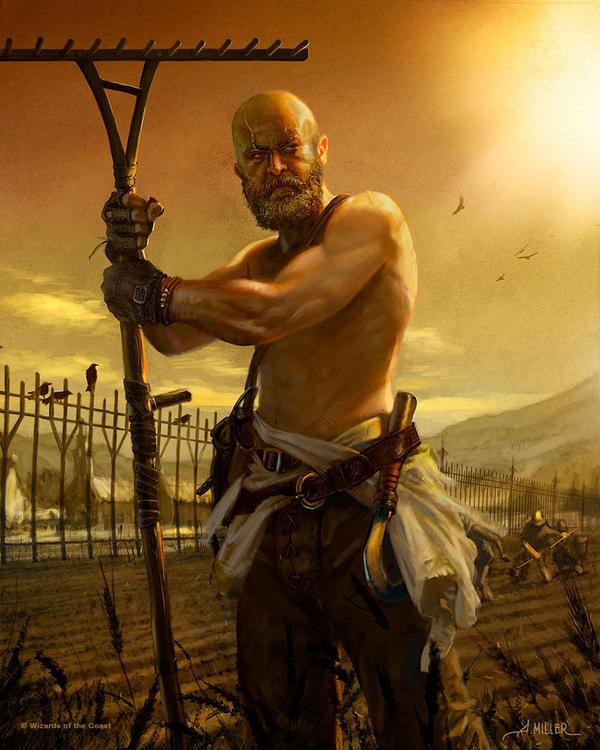


The Commoner
A sunburned halfling farmer griped his
trusty shovel as he pat his prized hog on
its head. The farmer and his strangely loyal
pig were all that stood between his family
farm and the goblins encroaching from the
nearby forest. As the latest party of goblin
marauders emerged from the wood, the hog
charged forward to defend its homestead.
The half-orc innkeeper surveyed his pub
for what would be the last time. As he looked
over the smoldering remains of his town, he made
a vow to whatever gods were listening. He would
avenge his fellow villagers, but more importantly,
he would get revenge on the bandits who destroyed
the pub that had been in his family for generations.
The hulking dwarf woman wiped the sweat from her
brow as she admired her hard day's work. She had finally
laid the final stones for the wall that would protect the new
settlement her clan had established outside the mountains. As she surveyed her work, satisfaction turned to anger. On the horizon, she saw the banners of the hobgoblin legion that had razed her previous home. She would not run again. As the horns bellowed in the distance she hefted her hammer.
The folk described above are all Commoners, simple folk of the land. Sometimes, if there are no heroes to be found, these folk are forced to take up arms to defend their homes.
People of the Land
Folk of the land, Commoners rely on the land under their feet to eke out a living. Finding work as farmers, herdsmen, and laborers, most commoners live a simple, yet exhausting life. Though, their labor-intensive lives make Commoners some
of the most resilient folk out there. They may not be the best looking or the most intelligent, but once a Commoner makes up their mind, there is nothing that can get in their way.
Humility & Grit
Commoners are many things, but above all they are humble. Relying on each year's harvest to make it through the winter, Commoners are no strangers to hardship. Most of the simple folk have experienced a great deal of difficulty in their lives: plague and disease, droughts and flooding, roving bands of orcs, and horrible monsters. Despite all of their struggles and hardship, Commoners have the grit to press on with life.
Creating a Commoner
When creating a Commoner, make sure to ask yourself, "why am I not just playing a class from the Player's Handbook?" Commoners are just that, common. They are not meant for adventure, and if you insist on playing as a Commoner, you are most likely going to be killed by the first rat you fight in a tavern basement. Should you somehow survive past the first monster encounter, consider why this character is still one of the common folk instead of a Fighter, Bard, or Barbarian.
In fact, I'm not at all certain why I decided to give this class the ability to make it past level 1, let alone all the way up to level 11! If you've made it this far you have probably made up
your mind on playing a Commoner. Good luck and enjoy!
Common
Superstition
Commoners aren't the brightest folk, and they often hold
to varying superstitions based on where they are from.
| d6 | Superstition |
|---|---|
| 1 | You refuse to step on cracks between floor boards or between the stones that line the roads for fear that your mother will break her back. |
| 2 | If you sneeze that means someone, somewhere is planning to kill you. |
| 3 | The real king died many years ago, but he was replaced by a secret council of lizardfolk. |
| 4 | Your town drunk was convinced that you were all part of a made-up game played by alien beings... and you are starting to believe him |
| 5 | You always sleep with a bag over your head for fear you soul will slip out in your sleep |
| 6 | You know for a fact that real adventurers will eat part of any monster they slay. |
Multiclassing and the Commoner
If your group uses the optional multiclassing rule, here's what you need to know if you choose to take your first level in the Commoner class.
Ability Score Minimum. As a multiclass character, you must have at least a Constitution score of 13 to take a level in Commoner, or to take a level in another class if you are already a Commoner.
Proficiencies. If Commoner isn't your initial class, here are the proficiencies you gain when you take your first level as a Commoner: nothing!





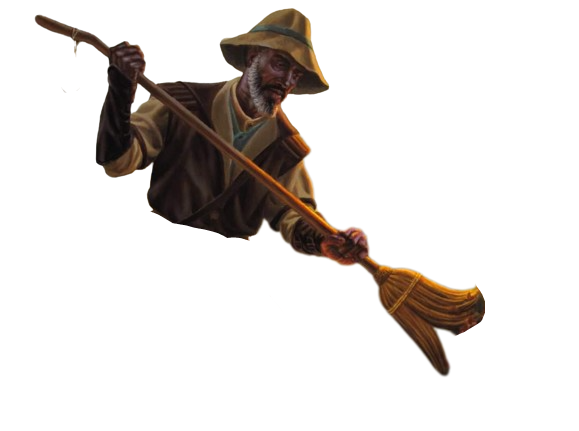

Class Features
Hit Points
- Hit Dice: 1d8 per Commoner level
- Hit Points at 1st Level: 8 + your Constitution modifier.
- Hit Points at Higher Levels: 1d8 (or 5) + your Constitution modifier per Commoner level after 1st
Proficiencies
- Armor: Light armor
- Weapons: Clubs, daggers, quarterstaffs, slings, and improvised weapons (usually pitchforks and torches)
- Tools: One set of artisan's tools of your choice
- Saving Throws: Strength, Constitution
- Skills: Choose two of the following: Animal Handling, Athletics, Insight, Persuasion, Religion, and Survival
Equipment
As a Commoner, you start with the following equipment:
- (a) leather armor or (b) a cloak, a sling, 20 rocks
- (a) a club and dagger or (b) a quarterstaff
Quick Build
You can make a Commoner by using this suggestion: Don't.
If you insist on playing a Commoner, make Constitution your highest ability score, followed by your Wisdom. Second, choose either the folk hero or guild artisan background.
Grit
You have grown accustomed to a life of hardship. At 1st level, you gain a pool of Grit Dice, which are d4s, to represent your determination in the face of adversity. Whenever you make an attack roll, ability check, or saving throw, you can expend Grit Dice up to your Wisdom modifier (minimum of 1), roll them, and add the total result to your roll. You can expend Grit Dice after you roll, but before you know if you succeed or fail.
You have a total number of Grit Dice in this pool equal to
1 + your Commoner level. You regain all of your expended
Grit Dice each time you complete a short or long rest.
The Commoner
| Level | PB | Features | Tall Tales |
|---|---|---|---|
| 1st | +2 | Grit, Rough & Ready, Trade | ─ |
| 2nd | +2 | Old Reliable, Tall Tales | 2 |
| 3rd | +2 | Trade Feature | 2 |
| 4th | +2 | Ability Score Improvement | 3 |
| 5th | +3 | Gumption | 3 |
| 6th | +3 | Weather the Storm | 4 |
| 7th | +3 | Know-How | 4 |
| 8th | +3 | Ability Score Improvement | 4 |
| 9th | +4 | True Grit | 5 |
| 10th | +4 | Trade Feature | 5 |
| 11th | +4 | Common No More | 5 |
Rough & Ready
You may not be the quickest on your feet, the strongest, or the most educated, but the hardships you have lived through have made you especially hardy. Starting from 1st level, you can use your Constitution, in place of Dexterity, when you calculate your Armor Class when you are wearing armor.
Moreover, when you are wearing no armor, your Armor Class is equal to 10 + your Constitution modifier.
Trade
Also at 1st level, you choose a Trade from the list below that best represents your livelihood and how you spend your days: Farmer, Innkeeper, Laborer, Old Timer, or Town Guard.
The Trade you choose grants you features at 1st level, and again when you reach 3rd, and 10th level in this class.
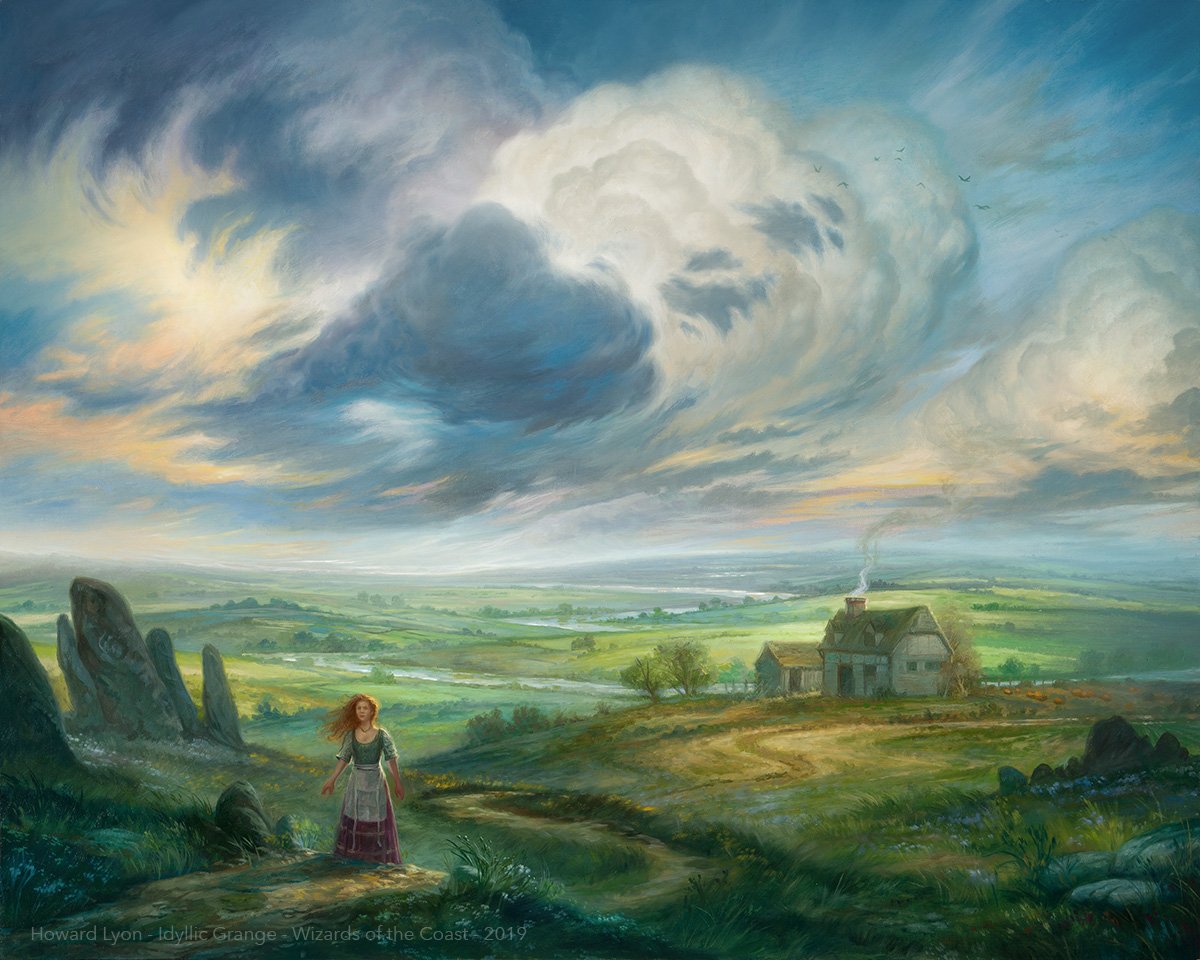



Old Reliable
You may not be able to conjure wondrous spells or wield the deadly weapons of war, but you know the tools of your Trade like the back of your hand. At 2nd level, you choose one tool or weapon proficiency you gained through your Trade. That tool or weapon becomes your Old Reliable, and you can use your intuitive understanding of it to wield it as a weapon.
If you choose a tool proficiency, you can wield tools from that set as improvised weapons that deals 1d6 bludgeoning, piercing, or slashing damage on hit. If you choose a weapon, its damage die becomes 1d6 if it was not already larger.
While wielding Old Reliable, you can use your Wisdom,
in place of your Strength, for its attack and damage rolls.
Tall Tales
As one of the common folk, you have heard many legends
and stories throughout your life that contain small bits
of wisdom. Should you somehow reach 2nd level, you
learn two Tall Tales of your choice from the list at the
end of this class description. The Tall Tales column of
the Commoner table shows when you are able to learn
more Tall Tales of your choice.
When you gain a Commoner level, you can replace one
Tall Tale you know with another Tall Tale of your choice.
Ability Score Improvement
If you survive to reach 4th level, and again at 8th level, you can increase one ability score of your choice by 2, or two ability scores by 1. As normal, you can't increase one of
your ability scores above 20 using this feature.
If your game uses the optional rule for Feats, you are not eligible to take a Feat in place of an Ability Score Increase.
Gumption
You are finally starting to get the hang of adventuring life and can apply your Grit in combat. Starting at 5th level, when you hit with an Old Reliable attack, you can expend Grit Dice, roll them, and add the result to your damage roll.
Your harsh life has also thickened your skin. Whenever you take damage, you can use your reaction to expend a Grit Die and reduce the incoming damage by an amount equal to your Grit Die roll + your Constitution modifier (minimum of +1).
Weather the Storm
You may not be able to dodge or deflect incoming blows very well, but you can take a hit better than most. Beginning at 6th level, when you are subjected to a spell or another effect that allows you to make a Constitution or Wisdom saving throw to take only half damage, you take no damage if you succeed on your saving throw, and only half damage on a failure.
Know-How
You can offer your simple wisdom to others. Beginning at 7th level, when a creature that can hear you within 30 feet makes an ability check or saving throw, you can use your reaction to add your Wisdom modifier (minimum of +1) to its roll.
You can use this reaction a number of times equal to your Wisdom modifier (minimum of once), and you regain all of
your expended uses when you finish a long rest.
True Grit
Your experience adventuring has toughened your resolve and ability to withstand any hardship you may face. Beginning at 9th level, when you begin your turn with no Grit Dice left in your pool, you instantly regain one expended Grit Die.
Common No More
You have achieved the utmost pinnacle of what a Commoner can be. Upon reaching 11th level, your Grit Dice become d6s.
You also take one level in another class of your choice, ignoring the normal multiclassing requirements for it. If the class grants you the Spellcasting feature, you can use your Wisdom in place of the normal spellcasting modifier.
Your 11th level in Commoner doesn't count against your total character level. For example, if you played to 20th level you could have 11 Commoner levels and 10 Bard levels.
Not So Common Adventurers
If you've made it this far into the commoner class you may be thinking, "where are levels 12 to 20?" The answer is a simple one, they don't exist!
Commoners are just that, common. If a player somehow survived all the way to 11th level with their Commoner character then congratulations, it is time to multiclass into a different class.
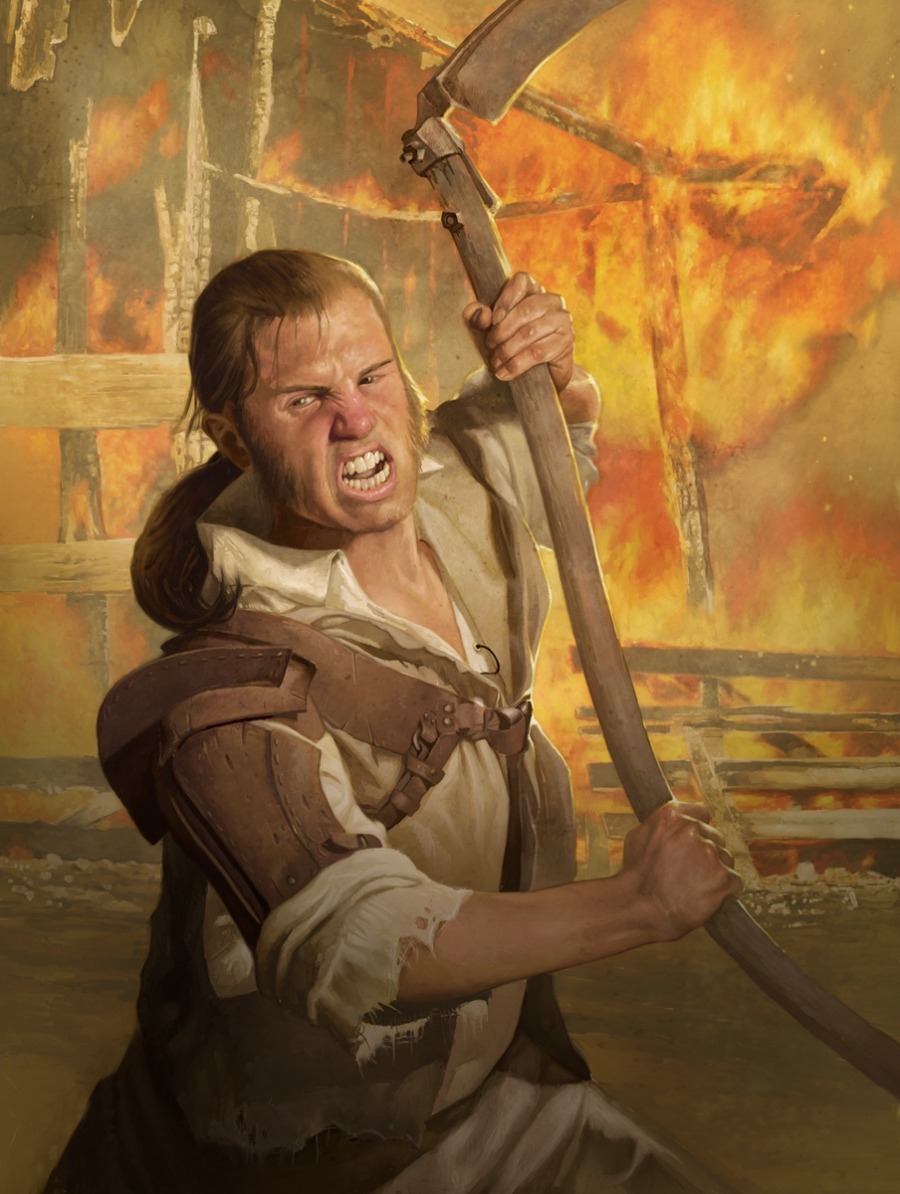





Trades
Choose the Trade below to best represents your livelihood: Farmer, Innkeeper, Laborer, Old Timer, or Town Guard
Farmer
You are a farmer, the true salt of the earth that brings forth a bountiful harvest each season. You know all there is to know about cultivating crops, livestock, and child-rearing - but little else. With your farmer's tools and trusty Loyal Livestock at your side, you are ready to face the adventuring life!
Loyal Livestock
1st-level Farmer feature
You have convinced a farm animal to adventure at your side. Your Loyal Livestock is friendly to you and your allies and obeys your commands. It uses the Loyal Livestock stat block, which uses your proficiency bonus (PB) in several places.
You choose either Male or Female for the gender of your Loyal Livestock, which affects the abilities it has in its stat block. If you acquire a farm animal of the other gender, you can train it to be your Loyal Livestock over the course of a long rest. You can only have one Loyal Livestock at a time, and training a second causes the first to forget its training.
In combat, your Loyal Livestock acts during your turn. It can move and use its reaction on its own, but it only takes the Dodge action unless you use a bonus action on your turn to command it to take an action from its stat block, or another action. If you are incapacitated, your Loyal Livestock can take any action of its choice to defend you to the best of its ability.
Should your Loyal Livestock fall to 0 hit points, it makes
death saving throws like a player character would.
If it dies, you can train any farm animal you
can buy, borrow, or steal to be your Loyal
Livestock over the course of an
hour, which can take place
during a short or long rest.
Loyal Livestock
Medium Beast, Unaligned
- Armor Class 10 + PB (natural armor)
- Hit Points 7 + five times your Commoner level
- Speed 30 ft.
STR DEX CON INT WIS CHA 16 (+3) 10 (+0) 18 (+4) 4 (-3) 10 (+1) 4 (-3)
- Senses passive Perception 10
- Languages ─
Beast of Burden. Your Livestock counts as one size larger when determining its carrying capacity and the weight it can push, drag, lift, or pull.
Farmer's Bond. You add your PB to any ability check or saving throw that your Livestock makes.
Hit Dice. Your Livestock has a total number of d12 Hit Dice equal to your Commoner level. It also gains all the normal benefits of both short and long rests.
Charge (Male Only). If your Livestock moves 20 feet toward a creature that is its size or smaller, and hits it with a Stomp, it must succeed on a Strength saving throw (DC equals 11 + PB) or be knocked prone.
Mother's Milk (Female Only). At the end of a long rest, your Livestock produces PB bottles of milk, which restore 2d4+PB hit points when consumed.
Actions
Stomp. Melee Weapon Attack: +3 +PB to hit, reach 5 ft., one target. Hit: 2d4 +3 bludgeoning damage.


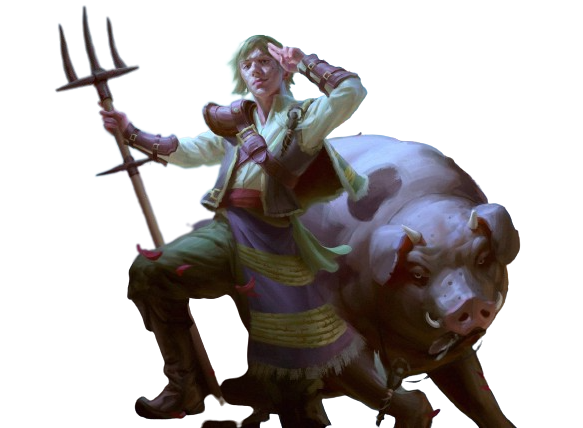
Green Thumb
1st-level Farmer feature
You know your way around a farm.
You gain proficiency in Animal Handling,
Nature, and farmer's tools. Farmer's tools
include hoes, plows, rakes, scythes, shovels,
and simple instruments to predict weather.
Also, whenever you would normally make
an Intelligence (Nature) check, you can make
a Wisdom (Nature) check in its place.
Fresh Produce
3rd-level Farmer feature
You always seem to have samples of produce.
As an action, you can expend one Grit Die and
reach into your bag to pull out a piece of Produce.
As part of that action, you can eat it, or feed it to a
willing and conscious creature within your reach.
Upon consumption, a creature gains temporary hit
points equal to your Grit Die + your Wisdom modifier.
Prizewinner
10th-level Farmer feature
You may not be wealthy, powerful, or intelligent, but your produce is bountiful. You gain the benefits listed below:
- Your Livestock Companion grows from Medium to
Large in size, and its hit points and hit point maximum increase by an amount equal to your Commoner level. - When you command your Livestock Companion to use
its Stomp attack, it can Stomp twice instead of once. - If you spend 8 hours or more working up to one square mile of viable farmland, the land you work gains the effects of the 8-hour casting of the plant growth spell.
Innkeeper
Innkeepers usually find themselves at the epicenter of their small villages. With a quick wit and a keen ear for gossip, an Innkeeper is adept at navigating the complex social structure of small towns and villages. Armed with their country charm and a few coins, these affable folk can befriend anyone.
Country Charm
1st-level Innkeeper feature
When you need to convince a rough customer of something you can lace your speech with country wit to charm friend and foe alike. As an action, you can spend Grit Dice to mimic the effect of one of the spells on the table below. It specifies how many Grit Dice you must spend to mimic each spell.
| Grit Dice | Spell Effects |
|---|---|
| 1 | friends, guidance, vicious mockery |
| 3 | charm person, heroism, hideous laughter |
| 6 | calm emotions, enthrall, suggestion |
| 8 | catnap, enemies abound |
Saving Throws. Some Country Charm spells require your target to make a saving throw to resist their effects. Based on your Wisdom, their saving throw DC is calculated as follows:
Country Charm save DC = 8 + your proficiency bonus
+ your Wisdom modifier.
Rustic
Hospitality
1st-level Innkeeper feature
You have spent many years comforting guests with
full pints and open ears. When you adopt this Trade you gain proficiency in Insight, brewer's supplies, and cook's utensils. Whenever you make an ability check with these proficiencies, you can treat a roll of 7 or lower on the d20 as an 8.
Storyteller
3rd-level Innkeeper feature
You have heard every story under the sun from your patrons, though you do have trouble remembering them all. Whenever you finish a long rest in a tavern or inn, you can replace one Tall Tale you know with another Tall Tale of your choice.
Full Belly Bravery
10th-level Innkeeper feature
You can inspire heroism with nothing more than food, drink, and a story. You, and any creature that completes a short or long rest with you, gains temporary hit points equal to your Commoner level + your Wisdom modifier (minimum of 1).
While a creature has these temporary hit points it cannot be charmed or frightened, and it gains a bonus to its saving throws equal to your Wisdom modifier (minimum of +1).
Finally, the Grit Die cost of your Country Charm spell effects are reduced by 1 (to a minimum cost of 0 Grit Dice).
Laborer
Strong as oxen, laborers are any Commoner that use their skills to keep their village running. Carpenters, woodsmen, masons, and blacksmiths are all considered laborers. Often experts in their chosen tools (and little else), a true laborer isn't afraid to put their body on the line to see a task through to its end. When you need a tough job done right, a laborer is the Commoner you need on your side.
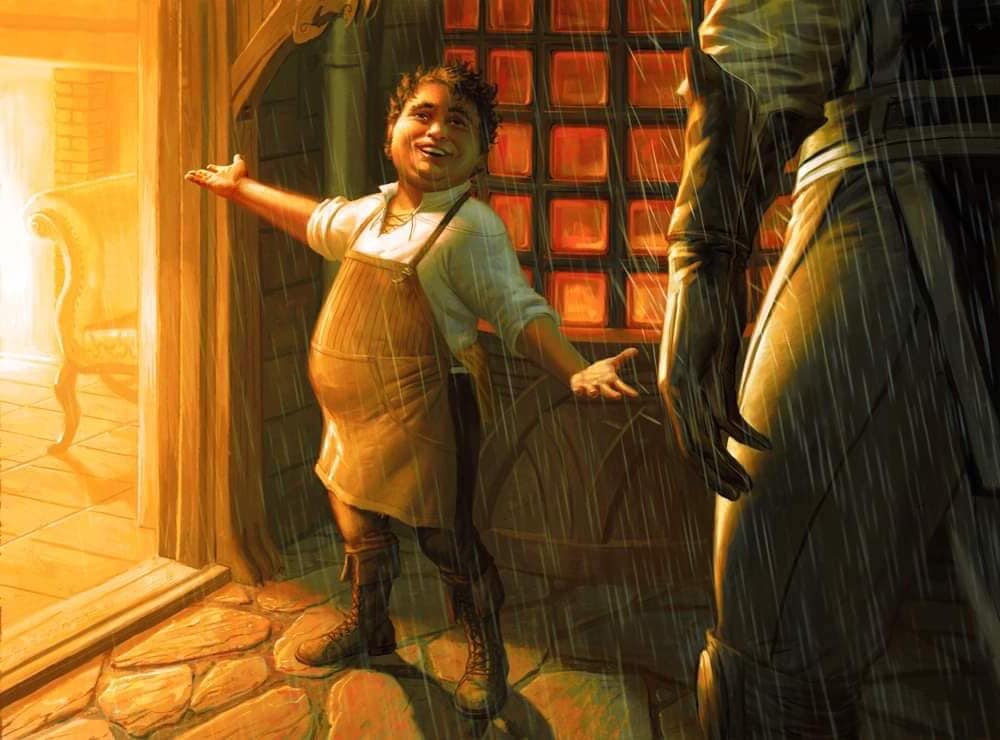




Bulky
1st-level Laborer feature
Spending your days in manual labor has made you strong and hardy like the great beasts of the fields. At 1st level, and each time you gain a level in this class, both your hit points and maximum hit points each increase by 1.
You also count as one size larger when determining your carrying capacity and the weight you can push, drag, or lift.
True Craftsman
1st-level Laborer feature
As a laborer, you are skilled with large physical tools. You gain proficiency with mauls, warhammers, greataxes, and battleaxes. However, these weapons you have trained with resemble simple tools rather than true weapons of war
You also gain proficiency with two of the following tools: carpenter's, mason's, smith's, or woodcarver's tools. When you make an ability check that uses these tool proficiencies you can add double your proficiency bonus to your roll.
Construction
3rd-level Laborer feature
You can use your knowledge of construction to create
simple structures of wood, stone, and iron. While you
have access to your True Craftsman tools and their
associated materials, you can build fortifications.
For every 10 minutes you spend, you create one
simple Medium structure made mostly from wood
or stone. These structures have an Armor Class
and hit points equal to 10 + your Commoner level.
Master Laborer
10th-level Laborer feature
You are a laborer of great renown, though you are
skilled with little else. While you have access to
your True Craftsman tools and their associated
materials, you can spend 10 minutes to replicate
the effects of the passwall or wall of stone spell.
Any structures that you create with this feature
are non-magical in nature and permanent.
Once you use this feature to produce the effect
of either spell you must finish a short or long rest
before you can use it again. If you have no uses of
this feature remaining you can expend 5 Grit Dice
to use this feature again.
Laborers of the World
Laborers are one of the most common types of Commoner found in the world, and their choice of True Craftsman tools determines what sort of labor they do:
Carpernter's. Wheelwrights, builders, roofers, carpenters, and thatchers.
Mason's. Architects, bricklayers, ditch diggers, builders, and stonemasons.
Smith's. Blacksmiths, locksmiths, armorers, and sword smiths.
Woodcarver's. Woodsmen, fletchers, basket weavers, lumberjacks.
Old Timer
You are a grizzled elder of your town or village who has seen an uncountable number of winters. Though your exact age escapes you, it is safe to say you are the oldest living person in your town. With your many years comes wisdom, but also a heavy dislike for anything that appears to be new.
Village Elder
1st-level Old Timer feature
Over the years you picked up a unique amount of country wisdom. You gain proficiency in one type of artisan's tools of your choice, and you learn to speak a number of languages equal to your Wisdom modifier (minimum of 1).
Sage Advice
1st-level Old Timer feature
You have learned many things over the years,
and can't help but share this knowledge,
even when it isn't wanted. You gain
proficiency in History, and when you
make an Intelligence (History) check
you can add your Wisdom modifier
(minimum of +1) to your roll.
You also learn the
guidance spell,
and Wisdom
is your
spellcasting
modifier for it.






Rustic Spellcasting
3rd-level Old Timer feature
You can draw on your knowledge of the natural world to perform minor magic spells, much like a Druid does:
Spell Slots. At 3rd level, you gain two 1st-level spell slots. To cast a Druid spell that you have prepared, you expend one of these spell slots. You regain all spell slots when you finish a short or long rest. As you gain levels, your spell slots grow in level, as shown on the Old Timer Magic table above.
Prepared Spells. At the end of a long rest, you prepare a list of spells that are available for you to cast from the Druid spell list. You can prepare a number of spells equal to your Wisdom modifier + half your Commoner level. Spells you prepare must be of a level for which you have spell slots.
Spellcasting Ability. Wisdom is your spellcasting ability for your Druid spells as you use the knowledge you have gained over your many years to perform your spells. You use your Wisdom when a spell refers to your spellcasting ability, setting the saving throw DC, or making a spell attack roll.
Spell save DC = 8 + your proficiency bonus
+ your Wisdom modifier
Spell attack modifier = your proficiency bonus
+ your Wisdom modifier
Rustic Knowledge
10th-level Old Timer feature
Your rustic magic is more flexible than that of classically trained mages. You can change your list of prepared Druid
spells each time you complete a short or long rest.
Old Timer Magic
| Level | Spell Slots | Slot Level |
|---|---|---|
| 3rd | 2 | 1st |
| 4th | 2 | 1st |
| 5th | 2 | 1st |
| 6th | 2 | 1st |
| 7th | 2 | 2nd |
| 8th | 2 | 2nd |
| 9th | 2 | 2nd |
| 10th | 2 | 2nd |
| 11th | 2 | 2nd |
Town Guard
You are the shield that protects your town from terrible trolls, the spear that keeps the darkness at bay, you stand watch in the midnight hours when all are asleep and evil lurks about, you are the noblest of Commoners, the Town Guard.
Militia Training
1st-level Town Guard feature
You have spent days learning the weapons of war that you may stand in defense of your village. You gain proficiency in medium armor, shields, and a single martial weapon of your choice. However, this martial weapon cannot have the heavy, finesse, special, or the two-handed property.
Simple Exploits
1st-level Town Guard feature
You wield the armaments of war as well as anyone who first picked up a spear three days ago. You learn a number of 1st-degree Exploits from those available to the Alternate Fighter equal to your Wisdom modifier (minimum of 1 Exploit).
Grit Dice. In order to use one of the Exploits you know you must expend one of your Grit Dice as part of the attack. If an Exploit you know requires you to roll an Exploit Die as part of its effect, you roll your Grit Die in its place.
Saving Throws. If an Exploit requires a creature to make a saving throw, the saving throw DC is calculated as follows:
Exploit save DC = 8 + your proficiency bonus + your
Strength or Dexterity modifier (your choice).
Lieutenant Guard
3rd-level Town Guard feature
Your skill in battle puts the other part-time Town Guards in your village to shame. Whenever you make an attack with your Old Reliable weapon, you gain a bonus to your attack and damage roll equal to one roll of your Grit Die.
Elite Guardsman
10th-level Town Guard feature
You are the champion of your small town or hamlet, and folk have started to wonder if you'll leave to join the local platoon of soldiers! You learn two 2nd-degree Exploits of your choice from those available to the Alternate Fighter.
In addition, any attacks you make with your Old Reliable weapon score a critical hit on a roll of 19 or 20 on the d20.
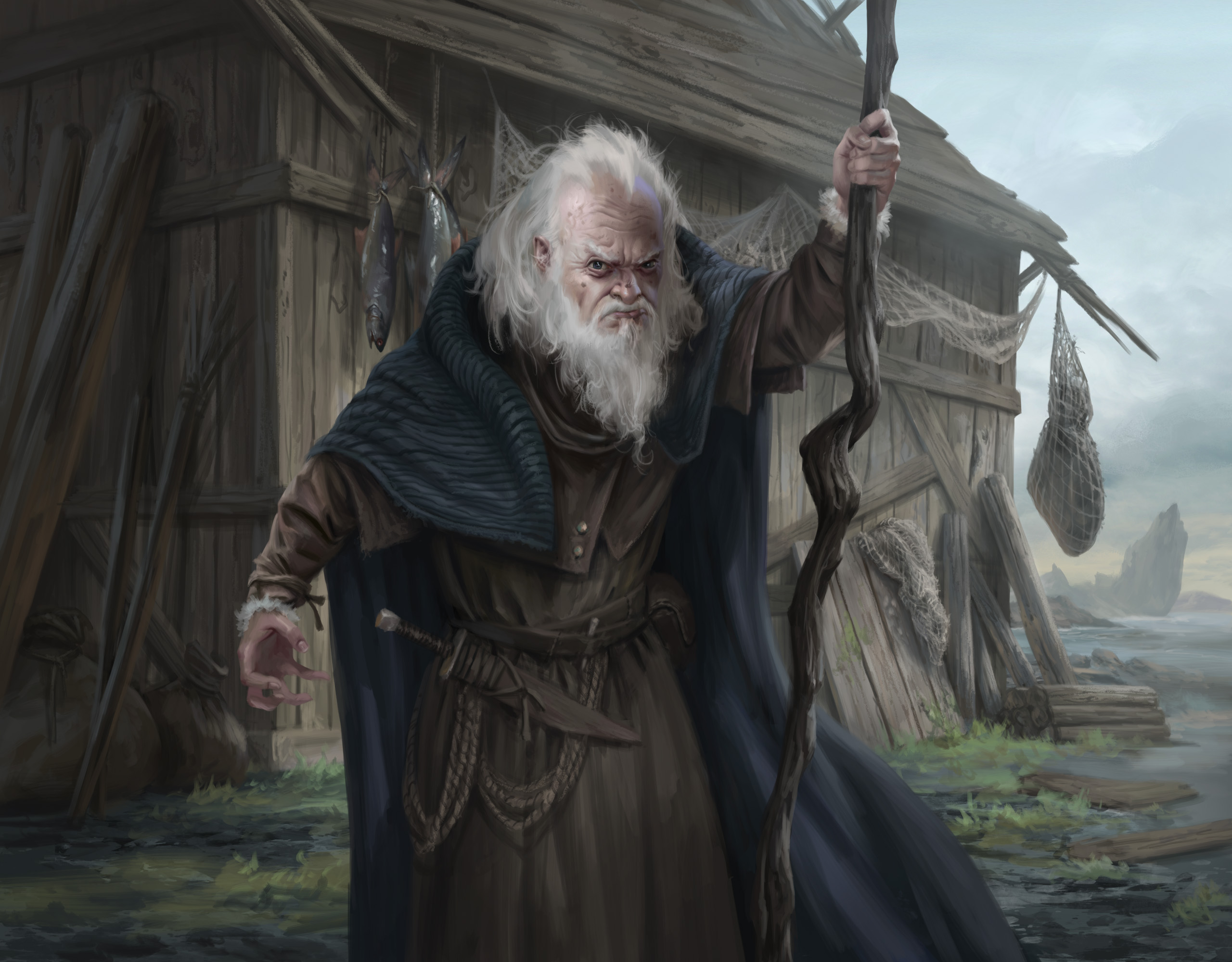





Tall Tales
Listed below are the Tall Tales available to a Commoner. Each time you gain a level in this class you can replace one of the Tall Tales you know with another Tall Tale of your choice, losing all the benefits and skills of the Tall Tale you replaced.
Tale of the Big Fish
A friend once told you the tale of their uncle who pulled a sea monster out of the ocean. You gain proficiency with fishing tackle and water vehicles, and if you have access to a body of water you can feed yourself and your companions for a day.
Once a day, you can tell your fish story to willing listeners. Those listeners become friendly toward you, though their continued amicability on their part depends on your actions.
Tale of the Boisterous Bard
When you were a young child you loved the tale of a Bard who traveled from town to town singing songs of heroes. You gain proficiency in Performance and one musical instrument.
When you travel to a new town you can always find a place to shelter you so long as you perform there each night.
Tale of the Crooked Con Artist
You know the story of the con man who pulled the wool over the eyes of your village. You gain proficiency in Deception and with disguise kits, and you make Wisdom (Deception) checks in place of the normal Charisma (Deception) checks.
Also, over a long rest, you can create a second identity that includes a disguise that allows you to assume that persona.
Tale of the Fearless Farmer
Your parents have passed down the story of a farmer from your village who many years ago stood up to a great tyrant. You gain proficiency with a martial
melee weapon of your choice that
lacks the heavy, finesse, special,
or two-handed properties.
Also, when you tell this tale,
common folk will offer you food
and shelter, though they won't
risk their lives for you.
Tale of the Menacing
Mercenary Company
Your friends always told the
story of a savage company of
mercenaries who roam the land.
You gain proficiency in shields
and a gaming set of your choice.
You have also learned enough
to pose as one of its members and gain
any of the benefits offered to members.
Other Tall Tales
The Tall Tales listed here are based on Backgrounds. To create custom Tall Tales, select one proficiency, one Background feature, and write an outlandish story to explain it all!
Tale of the Harrowing Haunt
The old crone in your town told you tales of the ghastly and grim monsters that used to haunt the village graveyard. You gain proficiency in Religion and Intimidation, and you can use this Tale to make Wisdom (Intimidation) checks.
Also, whenever you make an Intelligence check to recall information about evil or undead creatures, or necromancy magic, you can add your Wisdom modifier to your roll.
Tale of the Midnight Thief
Your cousin's neighbor once told you the tale of the world's greatest thief. Whenever you enter a new settlement, you are able to identify a den of criminal activity or thieves' guild.
Also, you gain proficiency with thieves' tools and gain the ability to identify, read, and communicate in Thieves' Cant.
Tale of the Unfortunate Orphan
Your parents always scared you with the tale of a child left to live alone on the streets of a big city. You have acquired a pet mouse like the child in the story. Your mouse is trained to obey simple commands and carry out simple tasks.
You also have advantage on ability checks made to find hidden routes, passages, and hideouts in towns and cities.
Tale of the Wandering Woodsman
Your grandmother told you stories of the woodsmen that protect your town from monsters. You gain proficiency with shortbows and in your choice of Perception or Survival.
Also, provided the land is not barren, you can hunt for
enough wild game to feed
up to five creatures.
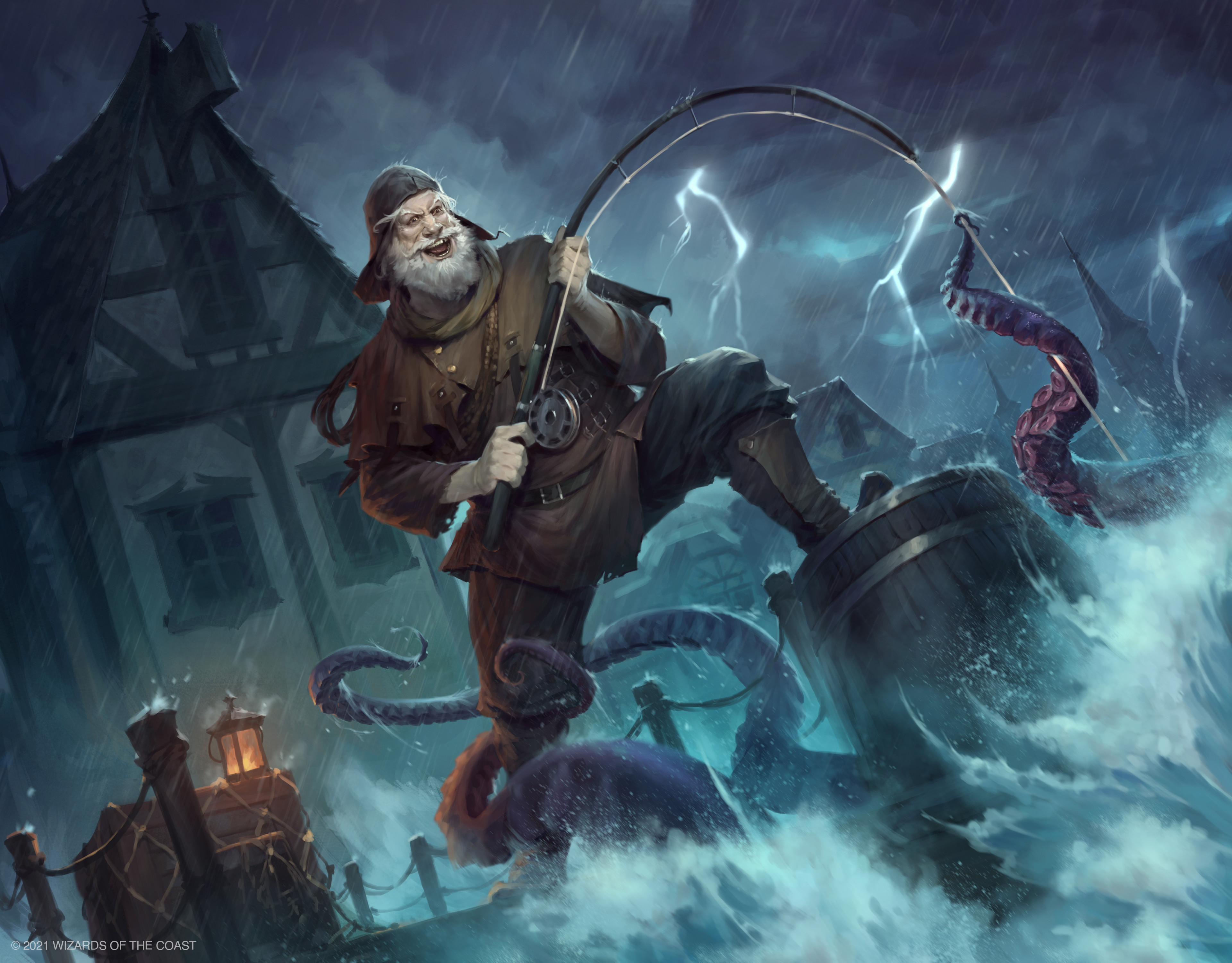


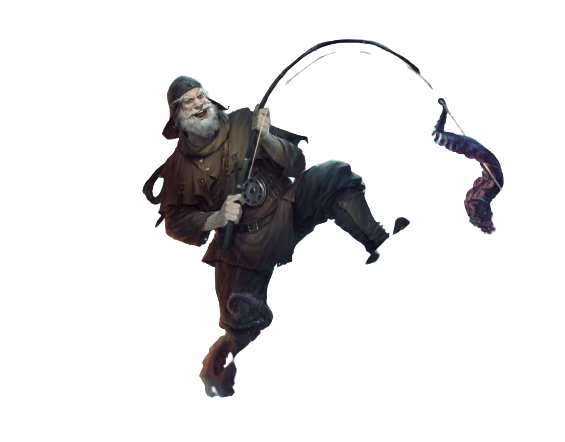

The Commoner
Venture out into the dangerous wilds beyond your village armed with nothing by your Grit,
Tall Tales, and one of five Commoner Trades:
Farmer - Innkeeper - Laborer
Old Timer - Town Guard
Version 1.2.0 - Created by /u/laserllama
Artist Credits:
Covers - Aaron Miller - Serf Token
Page 1 - Raoul Vitale - Devoted Grafkeeper
Page 2 - Howard Lyon - Idyllic Grange
Page 3 - John Stanko - Human Token art
Page 4 - Eelis Kyttanen - Rural Recruit
Page 5 - Eric Deschamps - Prosperous Innkeeper
Page 6 - Caroline Gariba - Fallaji Archaeologist
Page 7 - Daarken - Malevolent Hermit
Page 8 - Konstantin Porubov - Tireless Angler
